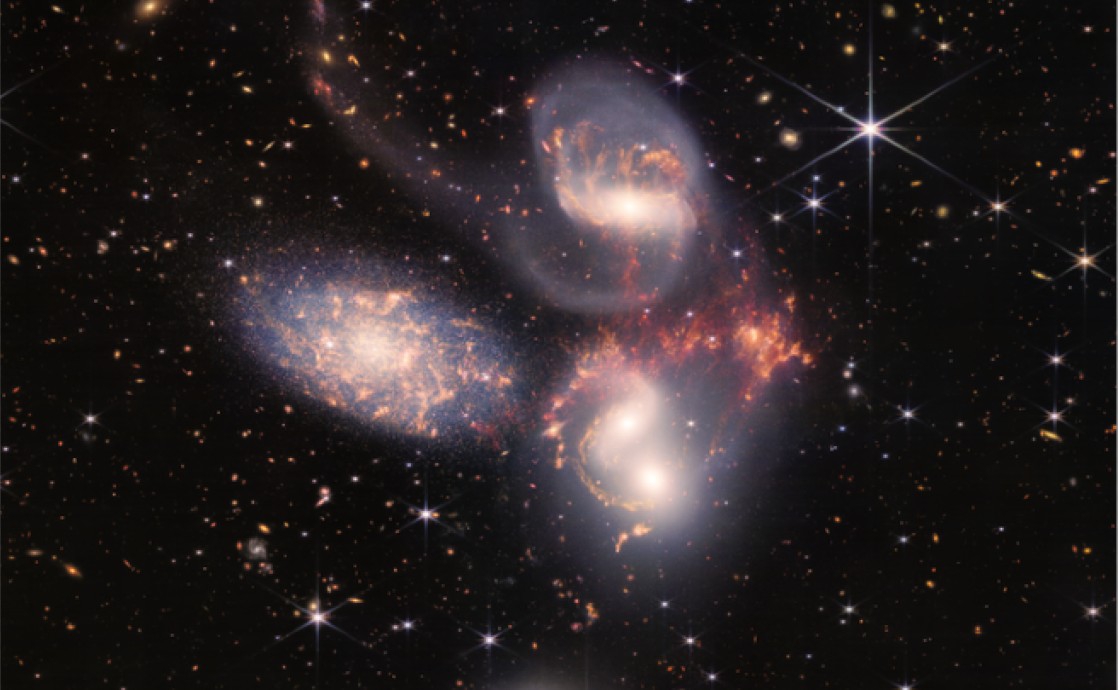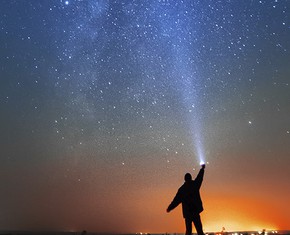The views expressed in our content reflect individual perspectives and do not represent the authoritative views of the Baha'i Faith.
In 1977 I didn’t know whether aliens were real or not, but I walked out of the very first Star Wars film when the movie aliens started blowing up planets indiscriminately.
It seems we’ve always assumed the beings that lived on other planets would be automatically hostile to humanity, without attempting to make contact or getting to know us first.
Since then, I’ve worried about the impact of the way the entertainment industry often portrays aliens and UFOs, or unidentified flying objects. Movies like “Independence Day” and “War of the Worlds,” portray extraterrestrial beings as menacing and destructive, seeking to conquer or harm humanity.
I wonder why we’re training a whole generation of young people to fear beings from other planets. Instead, I’d like to see us counter those prejudices before they form.
RELATED: Is There Something Else Out There?
How Could We Be All Alone in this Vast Cosmos?
The more I learn about the cosmos, the more it seems quite probable that we are not alone. For example, when I look at the images of space from the Hubble telescope, I wonder how anyone can view the Earth as the only inhabited planet, or believe that we’re somehow unique and alone in the infinite vastness of the universe. How can we possibly think that the universe is only ours to explore, and reject the idea that intelligent beings from other parts of the galaxy are also exploring?
The Baha’i teachings shine a bright light on this question. Baha’u’llah, the prophet and founder of the Baha’i Faith, writing in the mid-19th century, said: “Know thou that every fixed star hath its own planets, and every planet its own creatures, whose number no man can compute.”
The Universal House of Justice, the supreme governing body of the Baha’i Faith, addressed the question of life on other planets in this eminently logical way in 1982:
Obviously, as creatures of earth have managed to construct space probes and send them into outer space, it can be believed that creatures on other planets may have succeeded in doing likewise.
The Scientific Study of UFOs and UAPs
Humankind has been increasingly aware of the possible existence of UFO’s since 1947, when Kenneth Arnold claimed to see a group of nine high-speed objects near Mount Rainier in Washington while flying his small plane. From 1952 to 1969, reports of more than 12,000 sightings or events were recorded in the United States. Optical illusions and the psychological desire to interpret images are known to account for many visual UFO reports, and at least some sightings are known to be hoaxes, but what about the rest?
In the past, sightings of UFOs were sometimes ridiculed as speculative or specious – but lately, governments and their official bodies have begun to launch more science-based investigations.
Recently, in September of 2023, NASA released the results of a yearlong independent study which cautioned that the negative perception surrounding UFOs poses an obstacle to collecting actual scientific data. NASA’s involvement may help reduce the questions and myths around what it calls UAPs, or unidentified anomalous phenomena.
“We want to shift the conversation about UAPs from sensationalism to science,” NASA Administrator Bill Nelson said. He promised an open and transparent approach. … Nelson acknowledged with billions of stars in billions of galaxies out there, another Earth could exist. “If you ask me, do I believe there’s life in a universe that is so vast that it’s hard for me to comprehend how big it is, my personal answer is yes,” Nelson said at a news conference.
Also, the United States Pentagon has recently established a public clearinghouse for UAP information, data, and video evidence. The U.S. Defense Department’s new website, intended to serve as a central repository for declassified public records information about UAPs, called the All-Domain Anomaly Resolution Office (AARO), can be accessed here. The United States Congress created AARO in 2022, with the goal of coordinating efforts across federal agencies to detect and identify UAPs.
All of this new science-based investigation may lead us to much more realistic conclusions about life on other planets.
World Unity and Universal Unity
If extra-terrestrial life exists, why would we suspect they would be coming to destroy our world or its inhabitants? Why couldn’t we think of them as friendly explorers? After all, if they’ve been peacefully observing us for all this time and haven’t attacked us yet, why are we afraid that they will turn hostile now? Isn’t it possible that they might want to help us instead?
RELATED: I Used to Watch Cable News. Now I Watch the Universe.
The Baha’i teachings emphasize the agreement of science and religion – and also emphasize unity, peace, and the oneness of humanity. Abdu’l-Baha, the son and successor of Baha’u’llah, wrote:
… every era hath a spirit; the spirit of this illumined era lieth in the teachings of Baha’u’llah. For these lay the foundation of the oneness of the world of humanity and promulgate universal brotherhood. They are founded upon the unity of science and religion and upon investigation of truth. They uphold the principle that religion must be the cause of amity, union and harmony among men. They establish the equality of both sexes and propound economic principles which are for the happiness of individuals. They diffuse universal education, that every soul may as much as possible have a share of knowledge.
Central to the Baha’i teachings is the idea that all human beings represent part of a single, interconnected global family. In the future, this concept could certainly be extended to include potential extraterrestrial civilizations – forming a universal family. Baha’is believe that the oneness of humanity is a universal truth, making the idea of contact with extraterrestrial beings one of unity and cooperation rather than fear.
As a member of the Baha’i community who longs for a planetary peace here on Earth, I’m grateful that Baha’u’llah has given us a spiritual blueprint focused on unity and oneness. Because of what the Baha’i teachings say, I’m inclined to believe there are other beings on other planets and that they could be benevolent. I’d like to see more science, more exploration, and more movies such as ET: the Extra-Terrestrial or Arrival, which humanize our future contact with other planetary civilizations, as a way to train the next generations toward a truly universal peace.
















Comments
Sign in or create an account
Continue with Googleor